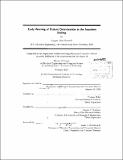Early warning of patient deterioration in the inpatient setting
Author(s)
Ciccarelli, Gregory Alan
DownloadFull printable version (20.20Mb)
Other Contributors
Massachusetts Institute of Technology. Department of Electrical Engineering and Computer Science.
Advisor
Thomas Heldt and George C. Verghese.
Terms of use
Metadata
Show full item recordAbstract
Early signs of patient deterioration have been documented in the medical literature. Recognition of such signs offers the possibility of treatment with sufficient lead time to prevent irreversible organ damage and death. Pediatric hospitals currently utilize simple, human evaluated rubrics called early warning scores to detect early signs of patient deterioration. These scores comprise subjective (patient behavior, clinician's impression) and objective (vital signs) components to assess patient health and are computed intermittently by the nursing staff. At Boston Children's Hospital (BCH), early warning scores are evaluated at least every four hours for each patient. Many hospitals monitor inpatients continuously to alert caregivers to changes in physiological status. At BCH, each hospital bed is equipped with a bedside monitor that continuously collects and archives vital sign data, such as heart rate, respiration rate, and arterial oxygen saturation. Continuous access to these physiological variables allows for the definition of a continuously evaluated early warning score on a reduced rubric. This thesis quantitatively assesses the performance of BCH's current Children's Hospital Early Warning Score (CHEWS). We also apply several standard machine learning approaches to investigate the utility of automatically collected bedside monitoring trend data for prediction of patient deterioration. Our results suggest that CHEWS offers at least a 6-hour warning with sensitivity 0.78 and specificity 0.90 but only with a prohibitively large uncertainty (48 hours) surrounding the time of transfer. Performance using only standard bedside trend data is no better than chance; improvement may require exploiting additional intra-beat features of monitored waveforms. The full CHEWS appears to capture significant clinical features that are not present in the monitoring data used in this study.
Description
Thesis (S.M.)--Massachusetts Institute of Technology, Dept. of Electrical Engineering and Computer Science, 2013. Cataloged from PDF version of thesis. Includes bibliographical references (p. 161-166).
Date issued
2013Department
Massachusetts Institute of Technology. Department of Electrical Engineering and Computer SciencePublisher
Massachusetts Institute of Technology
Keywords
Electrical Engineering and Computer Science.